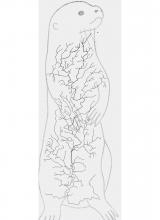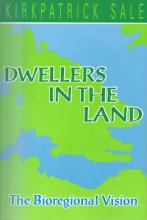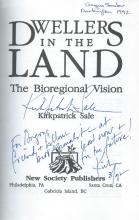The Northern School of Permaculture
You are here
A bioregional approach
"Imagine a world structured around ecological and cultural diversity, rather than national and political parameters. The realistic development of bioregionally focused communities and the places where they are established .... create a society that is both ecologically sustainable and satisfying to its inhabitants."
From an Introduction to "Dwellers in the Land" by Kirkpatrick Sale
The bioregional approach to development is intimately connected to people's sense of place. It is about our home, both in the narrowest and in the widest sense. At its heart is the harmonious integration of people and landscape, both the natural and the constructed landscape.
Unfortunately for us, this concept of a bioregional approach is so foreign to most people that that it benefits from considering it, initially at least, more as a conversation and less as thing. The definition and clarity will emerge from a process of multiple interactions, rather than an attempt to plan everything at the outset. In starting this process, we have taken take cues from Wendel Berry's recent essay on “movements” and from the rejuvenation of Scottish politics around the 2014 referendum.
Some of the distinguishing characteristics of bioregional development appear as follows, in that it emphasises:
- participation as opposed to “policy”
- strong underpinning from ethics and values
- pro-active rather than “protest”
- “blue economy” as opposed to “green” economy
- people are seen as producers, and not “consumers”
Participation
Individual actions come first, strategies and policies emerge from conversations amongst those doing the work. Connections have a huge importance in this, although current thinking around connectivity is influenced by the work of Donella Meadows on emergent systems and intervention points and also David Snowden on dealing with complexity.
Values and ethics
There are some key questions to ask at the outset. What kind future do we want to live in? What can we do to reshape our region? What does “sustainable” mean? These questions raise issues about deep values and how widely those values are shared. Bioregional work on creating the future is driven by a strong ethical dimension. Such fundamental matters are not widely discussed, although it will be impossible to achieve a consensus without doing so.
Actions and agents
Individual action is based around pro-activity rather than protest and "activism". The focus is on “quiet” and creative projects based, for example, on local food or renewable energy, or indeed, that favoured early strategy of community engagement and resource mapping.
Economy
In economic terms, the focus is on developing the blue economy as opposed to the usual (and ill-defined) approach to the “green” economy
Philosophy
People are involved and valued as producers in the process, as opposed to “consumers” of sustainable development.
Further reading
Kikpatrick Sale writes eloquently on the subject and his Schumacher Lecture on bioregionalism contains many of the formative ideas in "Dwellers in the Land"
See also an article on educational possibilities
Theme by Danetsoft and Danang Probo Sayekti inspired by Maksimer



